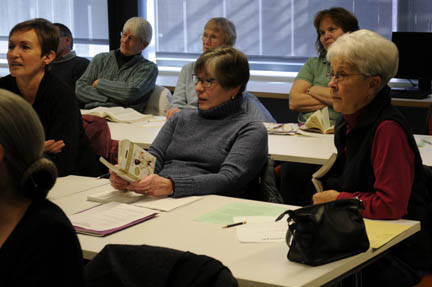
Adult Learning Force
Conceptual Emphasis

In summer 2017 Creating Landscapes experienced its twenty-eighth season, while at the same time, the Enrichment Collaboration (a Landscapes Learning Satellite) is launching its nineteenth year. As it turns out, this more than a quarter century exploration of learning and teaching continues to yield more questions than answers. Nevertheless, some ideas are becoming increasingly clear.
Landscapes learningis emancipatory education--differentiated by commitment to quality, simplicity, integrity, justice and fun. We can see that finding expressive form has the potential to transform individuals, relationships and communities—especially learning communities. We realize that aesthetic experience deepens and enlarges our abilities to notice, listen, sense, feel, and think critically. We know that the success of our serious playenterprisedepends on the ability to choose our collaborators carefully and to leverage every resource at hand. Finally, we now understand that of equal value to learning how to form significant questions is finding the courage to challenge traditional answers.
Landscapes learning insights are supported by a theory of learning known as constructivism. Some general ideas from constructivism may be useful to keep in mind as we continue our processes of rethinking and reforming our educational practices:
- Mind and art are to be thought of as verbs actively engaged in processes of meaning making…
- Learning is not the result of development; learning is development that requires invention and self-organization on the part of the learner. This means teachers must be prepared to encourage learners to raise questions, generate hypotheses and models, and test possibilities.
- Students must be allowed time to reflect on their learning. Allowing reflection time through journal writing, representation in multi-symbolic forms like song, dance, and story and/or discussion of connections across experiences or processes supports student meaning making processes.
- According to Catherine Fosnot, (1989), the classroom needs to be seen as a “community of discourse engaged in action, reflection, and conversation”. It is how we generate the further thinking required for us to become an actual learning community!
Of particular interest is the twenty-first century revision of Bloom’s Taxonomy--higher to lower thinking skills are listed in gerund form: Creating, Evaluating, Analyzing, Applying. Understanding and Remembering.
Clearly how we learn is every bit as important as what we learn’--so deep listening, collaboration, cooperation, and consideration are to be consistently honored!
Jan Hyatt for Creating Landscapes Learning Programs
Allegheny Coordinator Middle and High School Enrichment
August 2017
 TM
TM